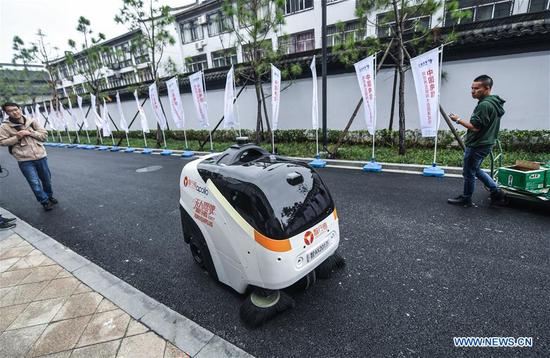
Attendees visit the China Mobile exhibition booth promoting 5G communication technology on Thursday during the Fifth World Internet Conference in Wuzhen, Zhejiang Province. (Photo by Zhu Xingxin/China Daily)
If all Chinese people secured lower-cost or free internet access, the internet industry could see exponential growth in market scale, analysts said.
"As more Chinese people enjoy the convenience of surfing the internet, free access to the internet has become increasingly important," said Zhang Fayou, an IT industry insider and co-founder of LinkSure Network, at a forum during the ongoing Fifth World Internet Conference.
"Through leveraging advanced technologies, including big data, users in the country are now able to access free Wi-Fi in all kinds of places. Chinese wisdom is bringing benefits to people from both urban and rural areas, and even overseas," said Zhang.
The internet industry in the world's second-largest economy has seen rapid growth over the last five years. From shopping and dining to housing and financing, over 800 million Chinese people are active in cyberspace today, boosting the development of internet-related businesses.
Nine of the world's top 20 high-market-value internet giants are Chinese, while five years ago, only two made the list, according to the Internet Trends report released by Mary Meeker, a partner at venture capital firm Kleiner Perkins Caufield and Byers.
Data from market consultancy International Data Corp show China's internet industry market scale grew by 97.8 percent in the first quarter of this year. However, nearly half of the population still has little or limited access to the web, and many live in rural or poorer areas.
Wang Li, who works at an internet company in Beijing, said in his hometown, a village of Nanyang in Henan province, only one family in three has Wi-Fi connectivity.
"Every time I return home during Spring Festival, it could cost several hundred yuan to use mobile data, just for a week," he said.
He added that most of the rural residents there are older people, who do not have much interest in using the internet.
At the end of 2017, internet penetration in rural areas was 35.4 percent, compared with 71 percent in urban areas, according to data from the China Internet Network Information Center.
Tian Li, director of the Internet Development Research Institution of Peking University, told People's Daily that companies are less interested in these regions due to the poor infrastructure and farmers' low internet adoption.
But this is changing.
According to a report by the China International Electronic Commerce Center in October, online shoppers living in villages spent over 632.2 billion yuan ($91 billion) nationwide from January to June, up 34.4 percent year-on-year.


















































